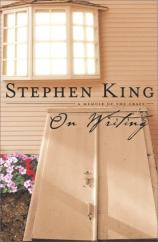On Writing: A Memoir of the Craft
Review
On Writing: A Memoir of the Craft
There is an immutable law that states: "People who love law and sausage should never watch either being made." People who love reading, I think, are a bit different. Who among us, in the middle of the latest work by one of our favorite authors, hasn't stopped and asked in wonder, "How do they do it?!"
Stephen King, in his (first) Forward to ON WRITING: A Memoir of the Craft, chats for just a bit about how he had been toying with writing a book about writing but wasn't sure if he had anything worth saying. The answer is yes, he does; and he has a few other things worth saying as well, about writing, about perseverance, and about the triumph of the human spirit over adversity.
ON WRITING is divided into five parts. The first, "C. V.," is largely, and wonderfully, autobiographical. It is not one of those intimate detail from first-breath-to-yesterday accounts; it is what King describes, quite accurately, as a series of snapshots. Even if you know every damn thing there is to know about Stephen King, from his shirt size to whether it's boxers or briefs, don't skip this part. "C. V." implicitly demonstrates what a talent this man is. I was familiar with a great deal of what is contained in this section, yet King is so compelling a wordsmith that I could not read fast enough, even though I (usually) knew what was going to happen. There are also a number of nuggets in here --- his account of the moment he got his inspiration for CARRIE, his battle with substance abuse --- that are worth reading about even if you have encountered these stories elsewhere. What does "C. V." have to do with writing? Quite a bit, actually; it exhibits --- sometimes painfully so --- the bits and pieces of the composite of the man we know as Stephen King. How does he do it? This is a part of the answer.
The second section of ON WRITING is titled "The Toolbox" --- what writers should bring with them when they sit down to write. These include things like vocabulary and grammar and a little volume titled THE ELEMENTS OF STYLE. "The Toolbox" contains very basic stuff that is so basic that a lot of us forget we have it. King's metaphor here is wonderful and provides a good introduction for what is the meat of the book, the third section, which, appropriately enough, is titled "On Writing." This is the section where King parts the curtain and reveals how he does what he does. King leaves out nothing here: he gives his reader an account of such things as where to write, when to write, how to handle revisions and the dreaded writer's block, who to show your work to (and when), and how to submit it. The "gosharootie" part of this section, however, is King's accounts of how he handled problems he encountered while writing such novels as THE STAND and MISERY. Then, to top it all off, he gives his reader a writing exercise, with an invitation to send the results to him!
There is more. "On Living: A Postscript" is a blow-by-blow account --- the most complete one that I have read --- about the near-fatal injuries that King sustained approximately one year ago. Again, King demonstrates incredible talent here. His ability to bring the reader to tears one moment and howling with laughter the next --- during the account of his accident, no less --- is on glass case display. And what does this accident have to do with writing? Everything, actually. King, post-injuries, didn't know whether he still had the stuff. And when he wanted to try...well, read the book. You might want to send Tabitha King a thank-you note too.
Last of all: "And Furthermore, Part One: Door Shut, Door Open" takes the reader through a first draft and revision of the first part of 1408, from King's audiobook BLOOD AND SMOKE. King shows us what he changed, and why. This is extremely fascinating, especially for aspiring writers: not even King gets it right the first time through. "And Furthermore, Part Two: A Booklist" is just that: a list of the best books that King has read in the previous three to four years. If you are on the lookout for new authors, this is the place to go.
ON WRITING is not an interlude between last year's HEARTS OF ATLANTIS and the forthcoming (at some point) FROM A BUICK EIGHT. This volume stands on its own. It will not replace THE ELEMENTS OF STYLE; it does, however, merit a place on your bookshelf right next to it. This may well be King's work of broadest appeal. Aspiring authors will find it invaluable. Fans of The Man will be fascinated. And those who have never read a book by Stephen King will discover what the rest of us already know. Highest possible recommendation.
Reviewed by Joe Hartlaub on October 3, 2000
On Writing: A Memoir of the Craft
- Publication Date: October 3, 2000
- Genres: Nonfiction
- Hardcover: 288 pages
- Publisher: Scribner
- ISBN-10: 0684853523
- ISBN-13: 9780684853529





